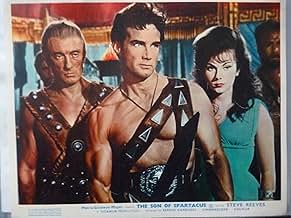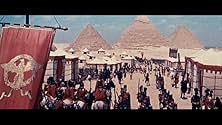IMDb RATING
5.9/10
669
YOUR RATING
During the power struggle between Caesar and Crassus, a Roman centurion, who is the lost son of Spartacus, is dispatched to Crassus' camp to observe his movements and keep Caesar informed.During the power struggle between Caesar and Crassus, a Roman centurion, who is the lost son of Spartacus, is dispatched to Crassus' camp to observe his movements and keep Caesar informed.During the power struggle between Caesar and Crassus, a Roman centurion, who is the lost son of Spartacus, is dispatched to Crassus' camp to observe his movements and keep Caesar informed.
Ahmed Ramzy
- Murdok - a Lybian Chief
- (as Ahmad Ramzi)
Abdulmuniem Abdulrahman
- Slave
- (uncredited)
Hussein Al-Meliguy
- Slave
- (uncredited)
Abdel Hameed Badawy
- Slave
- (uncredited)
Ala Badruddin
- Rebel Slave
- (uncredited)
Featured reviews
From Sergio Corbucci, director of the classic spaghetti westerns "The Great Silence" and "Django," comes a routine, but serviceable Italian sword-and-sandal epic staring Steve Reeves, best know for his many Hercules films. This was Reeves final on-screen appearance in this particular genre, later moving onto pirate and western films. "The Slave" has Reeves cast a Roman soldier who discovers he's actually the son of Spartacus, a slave turned gladiator turned rebel leader against the Roman Empire. Like his father, Reeves ends up leading a slave revolt. Unlike the Stanley Kubrick version of Spartacus, this film is minus interesting characters, dialogue, and narrative. However, Corbucci does bring strong visuals to the film and the production values of "The Slave" is better than most Italian sword-and-sandal pictures, which makes this film worth checking out for fans of these admittedly silly films.
This film, made at the twilight of Mr. Reeves film career, is certainly one of his best. The location work in Egypt and a rather big budget look add a great amount of, shall I say it?, realism to an essentially escapist, fantastical genre- the Italian sword and sandal flicks of the 1958-64 period. This picture also features some extremely diabolical villainy on the part of Crassus. Sir Laurence Olivier wasn't nearly this outrageously evil playing the same character in SPARTACUS! Steve's dilemma is pretty heavy in this one, doing a complete 180 from up and coming Roman centurions to advocate warrior of the freedom movement for the slaves of Rome. The action scenes stand up pretty well after 40 plus years.
10jimm-8
By 1970 Son of Spartacus (now out on DVD) found itself relegated to Saturday morning matinées, which is hardly surprising since Steve Reeves here seems to be getting twice as much combat duty as in most of the other Italian epics. So much so, one could hardly miss the kiddies re-enacting his many sword fights on the way home. Grown-ups too had something to admire, especially the eye-catching Ombretta Colli who conveniently gets shipwrecked with Reeves on a beach with her costume cut to shreds. This might prove an embarrassment to Miss Colli in later years when she went into Italian politics, no doubt hoping her voters would not remember her cheesecake days.
However, it is film music fans who have most to cheer, with a score derived from no less than three of the top Italian film composers. While Son of Spartacus was being filmed in Egypt during March and April of 1962, veteran maestro Carlo Innocenzi sadly died (on March 24). His stirring main title can still be heard in the M-G-M release, and it's an impressive full orchestral version of the slow execution march for Princess Elea in Goliath Against the Giants (1961). For the opening scenes M-G-M simply recycle Innocenzi's battle music from Goliath Against the Giants, but the opening narration is accompanied by the lovely "Glauco e Antonino" track from Lavagnino's Last Days of Pompeii (1959). For the rest of the score we get a mixture of new music by Piero Piccioni (a haunting desert tune and a rousing finale march when Reeves ultimately triumphs), plus some prior Piccioni material from Duel of the Titans (1961). The Italian language version (also available on DVD) is scored by Piccioni throughout, with a different main title adapted from "Amulio" in Duel of the Titans. Piccioni's entire score, including some unused cues, can be enjoyed on a CD thanks to those dedicated vault raiders at Digitmovies
However, it is film music fans who have most to cheer, with a score derived from no less than three of the top Italian film composers. While Son of Spartacus was being filmed in Egypt during March and April of 1962, veteran maestro Carlo Innocenzi sadly died (on March 24). His stirring main title can still be heard in the M-G-M release, and it's an impressive full orchestral version of the slow execution march for Princess Elea in Goliath Against the Giants (1961). For the opening scenes M-G-M simply recycle Innocenzi's battle music from Goliath Against the Giants, but the opening narration is accompanied by the lovely "Glauco e Antonino" track from Lavagnino's Last Days of Pompeii (1959). For the rest of the score we get a mixture of new music by Piero Piccioni (a haunting desert tune and a rousing finale march when Reeves ultimately triumphs), plus some prior Piccioni material from Duel of the Titans (1961). The Italian language version (also available on DVD) is scored by Piccioni throughout, with a different main title adapted from "Amulio" in Duel of the Titans. Piccioni's entire score, including some unused cues, can be enjoyed on a CD thanks to those dedicated vault raiders at Digitmovies
This is one of Steve Reeve's best ever films and possibly the last one in which he was in a tribune or Roman centurion costume...... Italian director Sergio Corbucci conconted up an idea to continue the life of Spartacus with Reeves as his son gaining a large measure of revenge on corrupt Roman counsel Ceasar Crassus who is running an illegal corrupt empire right in the heart of roman territory....In fact Crassus is getting so powerful that Ceaser himself sends Reeves to investigate what Crassus's methods are and report back to Caeser. Along the way on his trip to see Crassus the ship that Reeves is in hits a river barge and dumps him and a lovely Italian slave named Saida into the river. Reeves survives and he and Saida walk through the roman desert unaware that slave drivers are rounding up all the slaves they can to be bought and sold. Reeves and his gal are captured and Reeves breaks loose from the pack and wreaks his revenge on slave leaders with some dazzling sword work, wiping out a flock of slave drivers. One of the members of the slave band recognize a medallion worn by Reeves as the symbol of Spartacus, since the slave member was a member of Spartacus's force twenty years earlier. Reeves initially is unconvinced that he is truly the son of Spartacus and muses in a catacomb about his true identity. He sees the sword handle of Spartacus and it is the same talisman as his medallion. Reeves recognizes his true heritage and goes to work on wiping out Crassus and his evil empire......raid by raid Reeves and his band wipe out Crassus's gang all the while maintaining his identity as a roman centurion from Caesar.....in the end Reeves is caught and given a death sentence by Crassus....his followers then free him and Caesar must make a decision as to whether or not Reeves followed his orders as a true centurion. Caesar gives Reeves a death sentence but Reeves followers come to his rescue and Caesar relents. Good love story and the beautiful Ombretta Colli is Reeves's love interest. After this film Reeves became "Sandokan" and made one western in 1966 before retiring for good. I just love this film and Reeves had that marvelous physique that made any man drool!!!!! The immortal Steve Reeves, what a face and a body......
"The Slave" (aka Son of Spartacus) is a an excellent action Reeves film with a good story line to borrow from (the original Spartacus). Reeves learns of his heritage after being captured by a band of slave drivers in the Egyptian desert - also tagging along is a beautiful slave girl who along with Reeves survives being dumped overboard by a ship which hits a barge in the River. Great scene,when Reeves doubtful that he is Spartacus's son walks slowly into a small catacomb and finds the helmet and sword of Spartacus and muses for several minutes about his heritage - linking a medallion he has worn since birth with the same emblem on the sword handle of Spartacus. Also great action scene when Reeves rescues a band of prisoners of Ceasar Crassus who are tied into a large moat with water rushing in to cause a drowning execution. Excellent sword and action with several bad guys being wiped out by Steve, looking like an adonis with a metal helmet on in a great swashbuckling scene.....Reeves as a tribune of Ceasar finally realizes as did his dad, Spartacus, that the Roman empire cannot survive as a slave empire.....reluctantly Ceasar realizes it also and gives Reeves and his slave followers their freedom. Good cloak and dagger role for Steve as he poses as a tribune working for Caesar and also as the Son of Spartacus - wearing an impressive full head helmet to complete his disguise.
good
good
Did you know
- TriviaThis marked the final Italian sword and sandal/mythological muscleman movie to be made by Steve Reeves. He would make several "Sandokan" movies and a spaghetti western before retiring from the screen.
- GoofsThe story takes place during the triumvirate of Crassus, Caesar and Pompey (65-60 BC), but when Crassus talks with Verulus and Randus, with the Sphinx serving as background, it is plain that the monument has already lost its nose - a fact that would take place 1850 years later.
- Quotes
La schiava Seila: [to Randus] My friend, my life... is you - my love!
- Alternate versionsThe Italian theatrical version had a 101 minute running time, with minor censorship cuts for violence. The foreign versions, namely the UK (Son of Spartacus), the USA (The Slave), the German (Der Sohn des Spartakus), and the Finish, run over 102 minutes. Although unconfirmed, there are video versions in Italy and France cut to 97 or 95 minutes.
- ConnectionsFeatured in Cheezy Fantasy Trailers (2006)
- How long is The Slave?Powered by Alexa
Details
- Runtime
- 1h 40m(100 min)
- Aspect ratio
- 2.35 : 1
Contribute to this page
Suggest an edit or add missing content


















